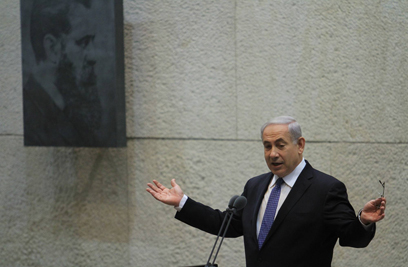
"After the cellular and 'open skies' (reforms), next week we will introduce reforms aimed at lowering the price of cars in Israel, followed by a huge reform of Israel's seaports, and we will then lower prices on a range of goods," Prime Minister Benjamin Netanyahu said Wednesday, as Finance Minster Yair Lapid's economic plan gains steam.
"No strike will dissuade us from carrying out these economic measures, for the benefit of the citizens of Israel. You cannot build a strong economy without competition," the PM said during a special Knesset session marking the 153rd birthday of Theodor Herzl, the founder of modern Zionism.
Related stories:
- Lapid faces opposition on seaport reform
- Lapid deputy dubs haredim 'parasites'
- Op-ed: Haredim have been stealing for years
"Less competition and greater centralization favors small groups. Competition is bad for the special interests, which are always strong. For the good of the nation, I am a strong believer in reforms that will break up monopolies, and we want to act in this direction, even if a little late. We intend to pursue big reforms and increase competition in the economy," said Netanyahu.

'For the good of the nation.' Netanyahu (Photo: Gil Yohanan)
During his speech, the PM mentioned main principles of Herzl's economic vision. "Jewish tradition has always emphasized the importance of education for all of Israel's children, and he (Herzl) says – we need competition. Today we call it 'start-ups'. He believed in the business world," Netanyahu told the plenum.
During the special session, Opposition Leader Shelly Yachimovich (Labor) compared unfavorably the income gaps in Israel to Herzl's egalitarian vision.
"Nowhere in the Zionist ethos does it say the State should be operated like a grocery store. On the contrary, the transfer of common goods to tycoons is a return to the galut (exile)," she said. "The economic policy of the past decade has been 'anti-Herzlian'," she said.
- Receive Ynetnews updates
directly to your desktop















